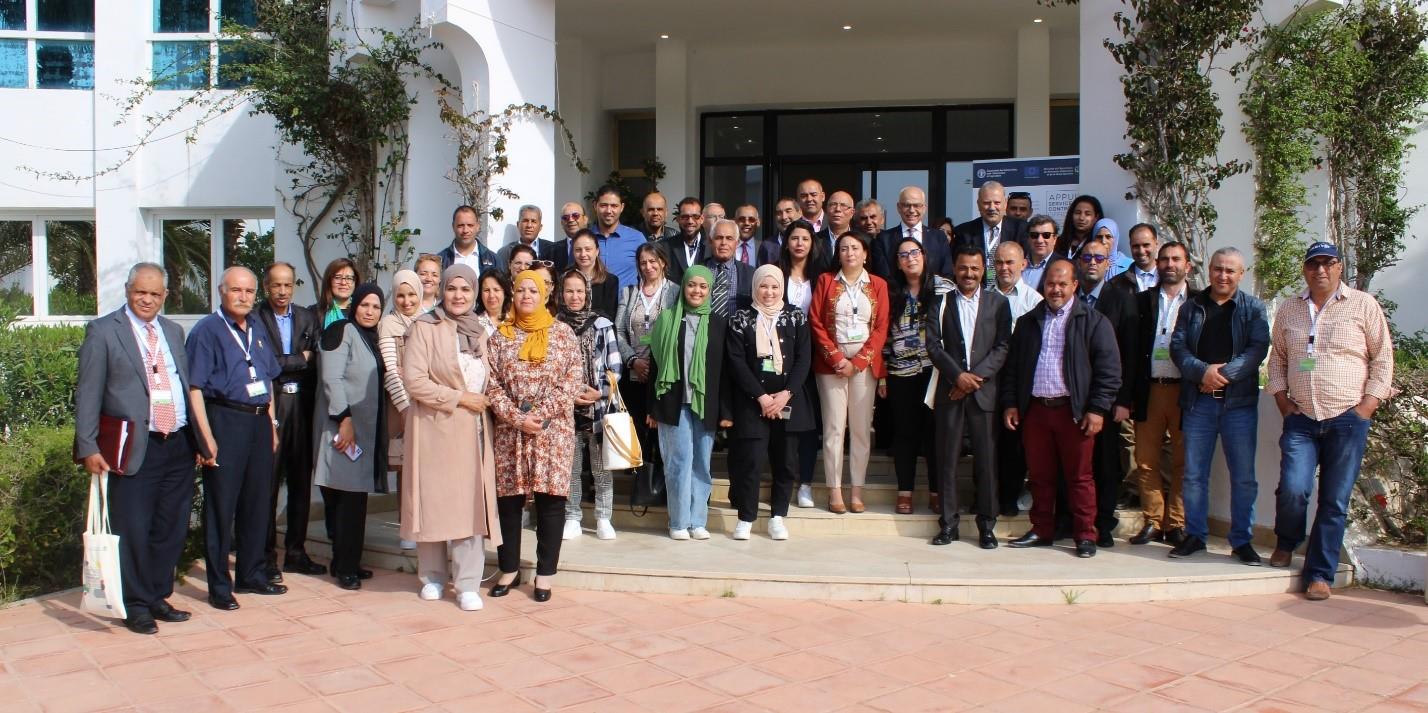National Symposium on "Pesticides for Agricultural Use and Alternative Control Methods"

25 April 2023, Tunis – A host of experts, senior officials from the Ministry of Agriculture, Water Resources and Fisheries, scientists and high-level academics are taking part in a national symposium to report on the state of play of the methods of pest control used in Tunisia. These plant protection specialists compared their information, the results of their surveys and research on the issue of the use of pesticides for agricultural use in Tunisia. The purpose being to define alternative control approaches and methods, identify the priority sectors where the use of pesticides is important and respond to the objective of the project "Support for Official Control Services for Animal and Plant Products" financed by the European Union and implemented by the FAO, in partnership with the Directorate General for Plant Health and Control of Agricultural Inputs (DGSVCIA).
Transform bad uses and practices through efficient and sustainable approaches
Is the agricultural use of pesticides a necessary evil? Their harmful effects on human health and the environment are at the origin of the recognized disadvantages. During the work, Prof. Mohamed Lahbib BEN JAMAA brilliantly explained how "without them, half of the harvest would be lost, the sanitary quality of agricultural commodities would be compromised and we could not meet global food demand". Better still, in their diversity, whether insecticides, fungicides, herbicides or others, these have the role of making it possible to secure the harvests, preserve the quality of the harvests and protect the crops against their bio-aggressors. If nothing is done, no agricultural products. No way to preserve harvests and protect crops against biological aggressors such as pests and parasitic insects.
In his speech, Mr. Mohamed ElHady Sidatt, Plant Production and Protection Officer at the FAO, recalled the urgency of taking steps to reduce the negative impact of pesticides on human health and the environment. The FAO promotes the rational use of pesticides and encourages the use of alternative methods to chemical control such as integrated control and the Farmer Field School approach (FFS). Mr. Sidatt also clarified the importance of developing phytosanitary guides for priority sectors in Tunisia.
In Tunisia the use of pesticides is regulated following law 92-72 of August 3, 1992, relating to the organization of plant protection. Two articles are to be retained: one (Art 16) relating to the obligation of an approval or a provisional authorization of sale for all pesticides for agricultural use before being marketed or used. The other (Art 17) relating to the obligation of prior authorization from the Ministry responsible for agriculture for any activity concerning the sector of pesticides for agricultural use (approval). It is also worth highlighting the obligation to comply with the provisions of specifications for all users, for importation, for storage operations, for distribution and for sale. The debates and exchanges highlighted the non-compliant practices observed in the field, such as the non-use of protective equipment by farmers, the non-compliant use of certain equipment, and more seriously, the pollution caused by the containers and materials after use and the impact of this waste on the environment.
This major issue was discussed during the symposium and lines of thought were followed on the questioning of the non-rational use of pesticides and the necessary awareness of the risks they can generate for the environment, as well as for human health and sustainable development.
In Tunisia, the use of alternative control methods to the use of conventional pesticides is nowadays accepted as the main lever for food safety, consumer health and respect for the environment. Also, the General Directorate of Plant Health and Control of Agricultural Inputs, promotes preventive control methods to reduce the harmful effects of pesticides. It is a question of promoting the agro-ecological approach and the integrated fight against crop enemies to ensure sustainable agriculture. This will make it possible to replace external inputs as much as possible with natural regulatory processes to be encouraged.
Contact
For further information contact:
MohamedElHady Sidatt
Plant health and production expert
Mail: [email protected]
Faten Aouadi
Communications Officer
FAO Office North Africa
Tel: 98703026
Mail: [email protected]
Imen Ghali
Communication Assistant
Project ASCO/FAO/UE
Project BIOREST/FAO/CS
Tel: 85972877
Mail: [email protected]
